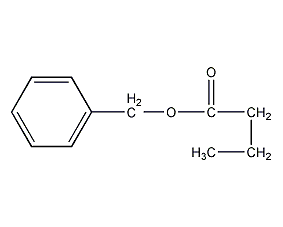
Structural formula
| Business number | 02NF |
|---|---|
| Molecular formula | C11H14O2 |
| Molecular weight | 178.23 |
| label |
Benzyl butyrate, Benzyl n-butyrate, Benzyl butyrate, Benzyl n-butanoate, n-Butyric acid benzyl ester, Flavors and fragrances |
Numbering system
CAS number:103-37-7
MDL number:MFCD00027133
EINECS number:203-105-1
RTECS number:ES7350000
BRN number:2047625
PubChem number:24900879
Physical property data
1. Properties: colorless liquid with floral aroma like jasmine and fruity aroma like pineapple and banana.
2. Density (g/mL, 25/4℃): 1.0111
3. Relative density (20℃, 4℃): 1.0111
4 . Melting point (ºC): Undetermined
5. Boiling point (ºC, normal pressure): 240
6. Boiling point (ºC, 2.0kPa): 130~132
7. Refractive index (n20): 1.492
8. Flash point (ºC): 107
9. Specific rotation (º ): Undetermined
10. Autoignition point or ignition temperature (ºC): Undetermined
11. Vapor pressure (kPa, 25ºC): Undetermined
12. Saturated vapor pressure (kPa, 60ºC): Undetermined
13. Heat of combustion (KJ/mol): Undetermined
14. Critical temperature (ºC): Undetermined
15. Critical pressure (KPa): Undetermined
16. Log value of oil-water (octanol/water) partition coefficient: Undetermined
17. Explosion upper limit (%, V/V): Undetermined
18. Explosion lower limit (%, V/V): Undetermined
19. Solubility: Easily soluble in ethanol and Ether, insoluble in water.
Toxicological data
Acute toxicity: rat oral LD50: 2330mg/kg; rabbit skin contact LD50: >5mg/kg
Ecological data
Usually not harmful to water.
Molecular structure data
1. Molar refractive index: 51.47
2. Molar volume (cm3/mol): 175.2
3. Isotonic specific volume (90.2K ): 427.9
4. Surface tension (dyne/cm): 35.5
5. Dielectric constant:
6. Dipole moment (10-24cm3):
7. Polarizability: 20.40
Compute chemical data
1.Hydrophobic parameters�Calculation reference value (XlogP): None
2. Number of hydrogen bond donors: 0
3. Number of hydrogen bond acceptors: 2
4. Number of rotatable chemical bonds: 5
5. Number of tautomers: None
6. Topological molecule polar surface area 26.3
7. Number of heavy atoms :13
8. Surface charge: 0
9. Complexity: 148
10. Number of isotope atoms: 0
11 .Determine the number of atomic stereocenters: 0
12. Uncertain number of atomic stereocenters: 0
13. Determine the number of chemical bond stereocenters: 0
14. Number of uncertain chemical bond stereocenters: 0
15. Number of covalent bond units: 1
Properties and stability
1. Avoid contact with strong oxidants.
2. Found in flue-cured tobacco leaves.
3. Naturally found in papaya, vanilla, and black tea.
Storage method
Store in a cool, ventilated warehouse. Keep away from fire and heat sources. should be kept away from oxidizer, do not store together. Equipped with the appropriate variety and quantity of fire equipment. The storage area should be equipped with emergency release equipment and suitable containment materials.
Synthesis method
1. Sodium butyrate and benzyl chloride are heated and refluxed in water. After the reaction is completed, the mixture is cooled, layered, and distilled under reduced pressure to obtain benzyl butyrate.
C3H7COONa+C6H5CH2C1→C3H7COOCH2C6H5+NaCl
The finished product is obtained by heating esterification of benzyl alcohol and butyric acid under the catalysis of sulfuric acid.
C3H7COOH+C6H5CH2OH[H2SO4] →C3H7COOCH2C6H5+H2O
2.Using benzyl alcohol and butyric acid as raw materials, in the presence of sulfuric acid catalyst Carry out esterification reaction and obtain it through neutralization, washing, drying and distillation.
3. Prepared by esterification reaction of butyric acid and benzyl alcohol.
Purpose
1. Mainly used for plasticizers and spices.
2.Used as floral and fruit-based flavors such as geranium, lily of the valley, rose, acacia, lily, jasmine, and jasmine. Blend the spices. Benzyl butyrate is an edible flavoring that is allowed to be used in my country. It is often used to prepare flavorings such as cheese, cream, apricots, plums, coconuts, peaches, bananas, pineapples, and strawberries, as well as rose and wine flavors. The dosage is based on normal production needs. Generally in chewing gum 310mg/kg; in candy 7.7mg/kg; in baking 9.9mg/kg in baked food; 6.9mg/kg in cold drinks. It can also be used as a soap fragrance.

 微信扫一扫打赏
微信扫一扫打赏

